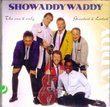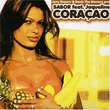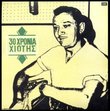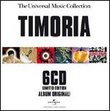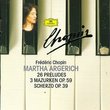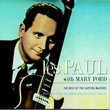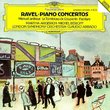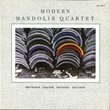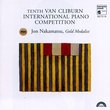| All Artists: Johann Sebastian Bach, Rosalyn Tureck Title: Johann Sebastian Bach: Goldberg Variations (CD plus score) - Rosalyn Tureck Members Wishing: 0 Total Copies: 0 Label: Deutsche Grammophon Release Date: 3/9/1999 Album Type: Enhanced Genre: Classical Styles: Chamber Music, Historical Periods, Baroque (c.1600-1750), Classical (c.1770-1830) Number of Discs: 2 SwapaCD Credits: 2 UPC: 028945959924 |
Search - Johann Sebastian Bach, Rosalyn Tureck :: Johann Sebastian Bach: Goldberg Variations (CD plus score) - Rosalyn Tureck
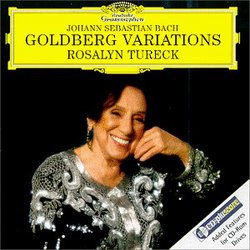 | Johann Sebastian Bach, Rosalyn Tureck Johann Sebastian Bach: Goldberg Variations (CD plus score) - Rosalyn Tureck Genre: Classical
Users with a computer can follow the score on screen and call up illustrated articles on Bach and his times and interactive musical analyses that are stored as text. They can format and print out the music, make additions ... more » |
Larger Image |
CD DetailsSynopsis
Product Description Users with a computer can follow the score on screen and call up illustrated articles on Bach and his times and interactive musical analyses that are stored as text. They can format and print out the music, make additions to the score, which can be addedin color, if desired. They can produce MIDI files of the work to practice with and to create personal interpretations. Texts are available in English, German, French, and Spanish versions.in color, if desired. They can produce MIDI files of the work to practice with and to create personal interpretations. Texts are available in English, German, French, and Spanish versions. Genre: Classical Music Media Format: Compact Disk Rating: Release Date: 9-MAR-1999 Similar CDs
Similarly Requested CDs
|
CD ReviewsRT gives thought to every note Rub�n | US | 07/06/2000 (4 out of 5 stars) "Like so many others weaned on Gould's versions, at first listen this was a disappointment. Once you downshift though, Tureck's cerebral, yet beautiful playing soon overwhelmed me. Just like Arrau, she plays each note and phrase with much thought and subtelty. The recording quality is excellent. A wonderful listen to this is late at night...." A worldview-shaping performance Rub�n | 10/12/1999 (5 out of 5 stars) "I've listened to several of Tureck's other recordings of the Variations and have been a Tureck (and Gould) fan for many years. But this version reflects the distillation of a lifetime's passionate study and is one of the d*mnd*st performances of any work I've ever heard." Slow and melancholical Rub�n | 03/24/2000 (5 out of 5 stars) "Slow and melancholical are the words i'd use for this performance. I can't imagine anything more beautiful than this. The absolute opposite of Gould's 1955 performance."
|

 Track Listings (16) - Disc #1
Track Listings (16) - Disc #1